Jonathan Lack’s “Dream Academy Award” Nominees – The Acting Categories – Best Actor, Actress, Supporting Actor, Supporting Actress

As explained in this article, I’m spending some time leading up to January 24th’s Academy Award Nominations not by predicting who will be on the final ballots, but by presenting who I think should be nominated for an Oscar in a perfect world. It’s the first annual Jonathan Lack’s “Dream Academy Awards,” and over the course of four articles, we’ll be going through nearly every category, with winners announced sometime in February!
Today, we continue with the very exciting Acting Categories, traditionally four of the most-hyped categories at the Oscars. 2011 was bursting at the seams with great performances from men and women alike – in fact, this was one of the meatier years for strong, deep female roles, and I’ve written quite a bit about them in this article. In any case, I’ve expanded each of the acting categories from the Oscars’ traditional five nominees to seven, as there’s no reason I should have to whittle down a year of great performances into an arbitrary number of slots. Hopefully you’ve at least heard of most of these movies and performances, and if not, they obviously all come highly recommended.
Without further ado, continue after the jump to read about my nominees for Best Actor, Actress, Supporting Actor, and Supporting Actress, with extensive analysis to boot…
Best Actor
George Clooney – “The Descendants”
Michael Fassbender - “Shame”
Ryan Gosling - “Drive”
Peter Mullan - “Tyrannosaur”
Gary Oldman - “Tinker Tailor Soldier Spy”
Andy Serkis - “Rise of the Planet of the Apes”
Michael Shannon - “Take Shelter”

Such a phenomenally rich category, where to even begin? Michael Fassbender and Ryan Gosling both had stellar years. “Drive” was clearly the best of Gosling’s work, a beautifully internalized performance that exuded cool in some moments, vulnerability in others, and always a remarkable sense of underlying, repressed humanity. In “Shame,” Fassbender played the most damaged and fascinating character of 2011, the sex-addict Brandon. I’m sure you know by now that I think “Shame” is the best film of 2011, and so much of that is due to Fassbender, who went further with this performance than most actors would ever dare go. He never shies away from Brandon’s dark and destructive personality – there’s a sequence in the last act where he violently chews out his sister (essentially projecting his own problems onto her) that absolutely breaks my heart – but like Gosling, humanity is the key to the performance. We really do care about Brandon; we feel sorry for him; we want him to get help.
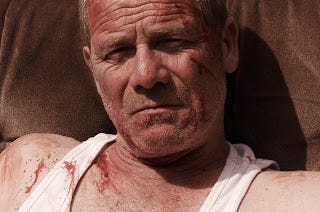
In “Tyrannosaur,” Peter Mullan, best known to American audiences for a small role as Yaxley in the penultimate “Harry Potter” film, also played an incredibly damaged character, Joseph, an alcoholic with anger issues. Like Fassbender, he finds the heart in someone we should, by all rights, be terrified of, and he is in total command of the screen at every turn. I’ve really enjoyed Michael Shannon’s work for a while now, but his work in “Take Shelter” was still a massive revelation. As Curtis, a man slowly discovering his own schizophrenia, Shannon etches the character’s fear in every line of his face; he portrays the sinking, helpless feeling of oncoming insanity so richly that we, the audience, run through a similar gamut of emotions.

Meanwhile, Gary Oldman may have delivered his best performance to date in “Tinker Tailor Soldier Spy,” and that’s saying something. His George Smiley is a fascinating creature, a man so firmly entrenched in the spy life that while he has seemingly lost the ability to feel, his mind operates on levels we can barely comprehend. Oldman can express so much in a single glance, a small gesture, and is ridiculously cool while doing so. George Clooney, another favorite actor of mine, also gave a performance one could argue is his best; in “The Descendants,” his normal Clooney persona is thrown into one of the most awkward and emotionally unstable situations imaginable, and watching Clooney slowly deconstruct the personality that has defined his career is mesmerizing.
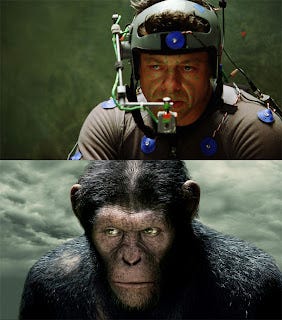
And finally, if you don’t believe that Andy Serkis deserves to be in this field for his motion-capture work in “Rise of the Planet of the Apes,” you are simply wrong. I’m sorry, but that’s just how it is. As the ape Caesar, Serkis was asked to express a rich and complicated character arc without a single line of dialogue or even a human form. No other performer has ever even attempted this, let alone pulled it off so spectacularly. He flawlessly portrays Caesar’s turn from loving, trusting young chimp to a bitter revolutionary, all while acting like a real ape. Yes, Weta Digital did their part in providing Caesar’s animated form, but if you understand the technology, you’ll recognize this is no different than slathering Leonardo DiCaprio in Makeup for “J. Edgar.” The difference? Digital makeup is actually convincing. Serkis deserved an Oscar for Gollum, he deserved a nomination for King Kong, and he deserves another one for Caesar. That he’s probably never going to get a nomination will go down as one of the major failings in Oscar history.
Best Actress
Olivia Colman - “Tyrannosaur”
Kirsten Dunst - “Melancholia”
Felicity Jones - “Like Crazy”
Charlize Theron - “Young Adult”
Tilda Swinton - “We Need to Talk About Kevin”
Kristin Wiig - “Bridesmaids”
Michelle Williams - “My Week With Marilyn”
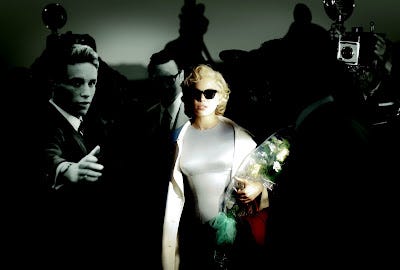
Again, a really great set of nominees, so deep and diverse that I’m unsure whom I would pick to win. Gun to my head, I think I would pick Michelle Williams, who was the one and only reason I loved “My Week With Marilyn.” It is the best performance of a historical figure I have ever seen, giving incredible insight into who Marilyn Monroe was, internally and externally, and making me understand, for the first time, why Monroe was such a captivating and commanding public figure. It’s a truly incredible feat of acting.

But then again, I could just as easily go with Tilda Swinton, whose brave, harrowing performance in “We Need to Talk About Kevin” dives right into one of the darkest personal questions imaginable: what if you didn’t love you child? Her arc in the film is a frightening, crushingly bleak road, and thanks to Swinton, the viewed is forced to feel every painful moment. Many of the same things could be said of Kirsten Dunst in “Melancholia,” who, in the film’s first half, flawlessly portrays a woman slowly but surely succumbing to clinical depression. In the second half, she’s already been consumed by sadness, and this is where Dunst really reveals the layers of piercing darkness we never before knew she could reach. And as long as we’re talking about dark characters in dark places….Charlize Theron in “Young Adult.” Like Michael Fassbender in “Shame,” Theron is willing to go anywhere with this role, to probe the emotional depths of a troubled mind while retaining a recognizable, palpable sense of humanity. Mavis is a largely internalized character, and Theron is terrific in a multitude of silently expressive moments; in the climactic scene where everything she’s bottled up finally bursts forth, she’s even better.
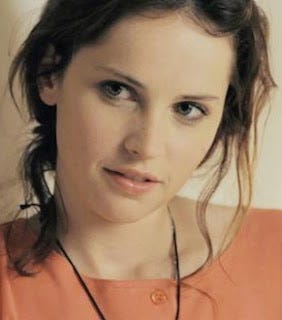
In “Tyrannosaur,” Olivia Colman plays a kind British housewife with an abusive husband, and our heart goes out to her at every turn. But Colman’s character isn’t merely a victim, and the richness of her performance is extraordinary (she and Mullan, nominated for Best Actor, made for one hell of an acting duet). The dark romance film “Like Crazy” was an acting triumph on every level, but no member of the cast impressed me more than young newcomer Felicity Jones, who gave what may be the rawest, most naturalistically real performance of 2011. I think I fell in love with her about five minutes into the movie. Finally, we have Kristin Wiig, star (and co-writer) of the year’s best comedy, “Bridesmaids.” Melissa McCarthy is getting most of the awards attention for this film, and while McCarthy is gloriously funny, her performance isn’t nearly as rich, detailed, or engaging as Wiig’s. Wiig too was hilarious, but her character, Annie, is also suffering what some might call a nervous breakdown, and it’s the dramatic material involving Annie’s quest to put her life back together that made “Bridesmaids” great. Wiig is absolutely fantastic, and if there’s any justice in the world of acting, she will be one of America’s most instantly recognizable comic stars a few years from now.
Best Supporting Actor
Albert Brooks - “Drive”
Benedict Cumberbatch “Tinker Tailor Soldier Spy”
Ben Kingsley - “Hugo”
Nick Nolte - “Warrior”
Patton Oswalt - “Young Adult”
Christopher Plummer - “Beginners”
Alan Rickman - “Harry Potter and the Deathly Hallows Part 2”
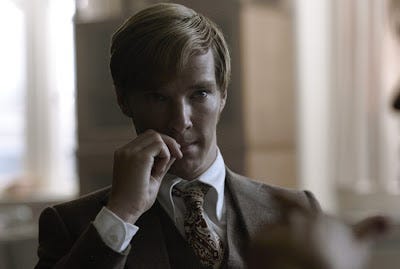
Of all the acting categories, this was by far the hardest to narrow down to seven. Part of that was the simple fact that “Tinker Tailor Soldier Spy” exists, and between Benedict Cumberbatch, John Hurt, Mark Strong, Tom Hardy, Colin Firth, and Toby Jones, it would have been easy to just fill this category with the film’s ensemble cast. But Cumberbatch impressed me the most, so he’s my nominee; effortlessly cool and collected for most of the film’s run-time, Cumberbatch also has a few key sequences where he gets to be vulnerable, scared, and open, highlighting the devastating effects of the dangerous spy-life. Watching Cumberbatch, one gets a sense that this man could grow old to be just like Oldman’s character, George Smiley. Plus, Benedict Cumberbatch has the coolest name in the world, so there’s that.

Christopher Plummer, meanwhile, is the current front-runner for the actual Oscar, and I will applaud when he wins. As an elderly gay man coming out of the closet near the end of his life, Plummer’s work in “Beginners” is remarkably vulnerable, but also so full of joy, and sadness, and everything in between. He has created what feels like a real human being, and we instantly understand the depths of the main character’s grief at losing Plummer, his father. In “Warrior,” Nick Nolte also plays a father, albeit an abusive and alcoholic one. Or, at least, he was when his children were growing up, and though he’s now 1000 days sober, it’s too late to win back the love of his kids. Thanks to Nolte, though, that doesn’t stop us, the audience, from caring deeply for this broken old bastard. It might be the defining performance of his career.
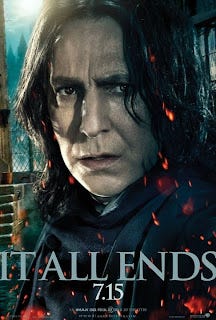
Speaking of defining, I think it’s safe to say that the words “Severus Snape” will be engraved onto Alan Rickman’s tombstone, such was the iconic perfection of his portrayal, and the final “Harry Potter” film was Rickman’s best showcase yet, as he was able to flesh out and humanize a previously stoic character in one marvelous, tear-jerking sequence. Ben Kingsley also got his fair share of tears in “Hugo.” As silent-film pioneer Georges Meliles, Kingsley stars the film as a scary, damaged antagonist for the main character, but we slowly learn who he really is, and why he’s become so cold, and as we do so, Kingsley adds layer upon layer to his portrayal. It’s the best role Kingsley has had in many years.
Finally, we have two actors who broke type and stunned audiences in doing so. Patton Oswalt is known for being one of the world’s funniest stand-ups, but as a guest spot on the short-lived TV show “Dollhouse” or his lead role in “Big Fan” told us, he’s also a brilliant dramatic actor, and “Young Adult” is his best performance yet. Like Theron’s character, Oswalt’s is irreparably damaged, but we connect with and feel for him instantly; my favorite scenes of this film involved Oswalt, and to me, it’s between Plummer and him for the (imaginary) win. Albert Brooks, meanwhile, played the villain in “Drive,” and a damn, damn good one at that. Brooks himself explains it better than I can: “For me, it was an opportunity to act outside the box. I liked that this mobster had real style. Also, he doesn’t get up in the morning thinking about killing people. He’s sad about it. Upset about it. It’s a case of, 'Look what you made me do.’” Was any screen character in 2011 quite as casually scary as Brooks? I think not.
Best Supporting Actress
Berenice Bejo - “The Artist”
Jessica Chastain - “The Tree of Life”
Charlotte Gainsbourgh - “Melancholia”
Melanie Laurent - “Beginners”
Carey Mulligan - “Shame”
Carey Mulligan - “Drive”
Shailene Woodley - “The Descendants”

Another ridiculously great category, this one kicks off with a pair of dueling Carey Mulligan performances. As Irene in “Drive,” Mulligan perfected the soft, reserved, internalized persona she’s been known for up to now, and is just as impressive as star Ryan Gosling for it. In “Shame,” though, she breaks every single preconceived notion about the outer limits of her already considerable talents; her character, Sissy, is the opposite of Irene – she’s an external creature, wears all of her emotions on her sleeves, and buries very little deep down. She’s a force of nature, a wildfire so fierce and beautiful and captivating that even the main character, her sex-addicted brother Brandon, has to confront his inner demons when she’s around. Plus, Mulligan is at the heart of 2011’s single best scene, Sissy’s mesmerizing blues performance of “New York New York.” Having thought long and hard about 2011 in film, I have no qualms in saying that Mulligan’s turn in “Shame” was my very favorite performance of the year.
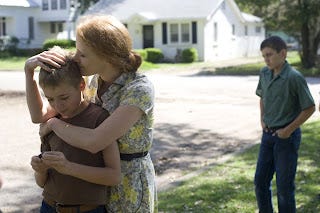
Jessica Chastain had a fantastic debut year, starring in no less than seven films, and I loved her in everything I saw her in. And if Carey Mulligan didn’t exist, Chastain would unquestionably win this category for “The Tree of Life,” where her beautifully ethereal performance as the mother, Mrs. O’Brien, defines everything I love about the movie. There’s something hypnotic about how perfectly Chastain captures a child’s vision of the God-like qualities of motherhood. In my analysis of the film, I wrote these words: I see so much of my own mother [in her performance.] Her enthusiasm for life, her playfulness, her kindness, her unfathomably warm smile that assures safety in no uncertain terms, and most importantly, her love: unquestionable, unwavering, etched in every line of her face and expressed in every action.
Melanie Laurent, who deserved an Oscar in 2009 for “Inglourious Basterds,” was simply awe-inspiring in “Beginners.” The film calls for every member of the ensemble to be emotionally open and vulnerable, and Laurent, whose character is the film’s biggest enigma, met those demands and then some. She spends the first act completely silent, but even when she does start talking, she still says more without words. “Beginners” is full of devastating moments, and Laurent provides many of them, breaking the audience’s heart with a single glance.
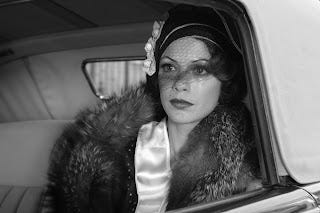
They say depression and anxiety are two sides of the same coin. In “Melancholia,” Kirsten Dunst played depression, and Charlotte Gainsbourough was every bit her equal as anxiety (aka her sister, Claire). She carries the film’s second act, and as a mirror for the audience, we feel every last terrible feeling of overwhelming fear she experiences. Moving into happier territory, Berenice Bejo’s ‘Peppy Miller’ was my favorite part of “The Artist.” All spunk, verve, and loving warmth, Peppy is simply a classic screen character, and the fact that Bejo expresses so much in a silent film makes her performance even more impressive. Finally, 20-year-old Shailene Woodley burst onto the scene in grand fashion with her poignant, mature turn in “The Descendants,” stealing the show away from George Clooney for large chunks of screen-time. She’ll very likely get a real Academy nomination, and she’ll deserve it.
That’s it for today!
Come back Thursday, January 19th, for THE FINAL nominations,
Including all the BIG categories!
FULL Schedule:
The Technical Categories – Tuesday, January 10th
Music and Sound – Thursday, January 12th
The Acting Categories – Today, Tuesday, January 17th
The Big Categories – Thursday, January 19th
Actual Oscar Nominations – Tuesday, January 24th

